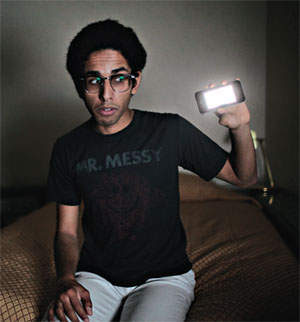▶ Cautious Comedy Subverts the Rules of Saudi Society
Fahad Albutairi runs a comedy show on YouTube that cautiously criticizes the Saudi government.
RIYADH, Saudi Arabia - You know you are attending a Saudi Arabian comedy night when the performance tent is pitched 80 kilometers out into the desert to avoid the morals police and, astonishingly, the ushers are women, even if they remain shrouded by black garments.
Then the swirling disco lights and giant speakers go still for evening prayer. And sex determines the seating - bachelors on the right, families including women on the left.
“I love Riyadh!” the master of ceremonies starts in Arabic, eliciting a tepid response from the audience of about 1,000 people : “When you walk on the streets, you don’t see any women!”
Stand-up comedy in Saudi Arabia remains a somewhat clandestine affair, emerging from the raw local performers hired as warm-up acts for the mostly Arab-Americans who began touring the Middle East a few years ago. But Saudi comics are now coming into their own.
Two have established wildly popular shows on YouTube ? not least because the Web has emerged as the one public space in the kingdom where it is O.K. to endorse the Arab uprisings. Comedy nights have just switched to Arabic from English, broadening their appeal, and comedians have even been asked to entertain at Koran conferences.
“It is really convenient for Saudi society because it is one person on stage; there is no acting, no women on stage, no men dressed as women,” said Ahmad Fathaldin, a 25-year-old medical student and one of six young people who write and perform the hit series “On the Fly” on YouTube. “Socially it is accepted.”
Another factor that helped spawn the comedy phenomenon, and pushed it onto YouTube in the first place, is the stifling sameness of Arab television networks.
“TV is dying a slow and painful death in this region,” said Fahad Albutairi, 26, a geophysicist and selfdescribed skinny nerd who graduated from the University of Texas at Austin . Last November he started the other hit Saudi show on YouTube, “La Yekthar,” or “Zip It.”
Among the nearly 19 million Saudis, about 70 percent are under 30. They cannot abide yet another 200 episodes of some Turkish soap opera, Mr. Albutairi said.
“The programs don’t reflect things that matter to the average Saudi,” he said. “We broadcast out of Saudi for Saudi people by Saudi people.”
Omar Hussein, a wiry 25-year-old, supervises a diaper production line for an American conglomerate and uses his free time to star as the main mocking newscaster in “On the Fly.” Last year he and the other founders sought to create “socially responsible comedy” that reflects the news and national chatter.
The shows avoid mentioning the royal family and the absence of the Arab Spring in the kingdom. They rarely touch on the judiciary system or other bastions of Islamic puritanism.
It is a measure of the freer speech available on YouTube that they can go even as far as they do.
The popular revolts rocking the Arab world have horrified the Saudi monarchy, to the point that Saudi Arabia deployed troops to smother the uprising in Bahrain.
Of the two shows, “On the Fly” skates a little closer to the precipice on political and social taboos. It ran with a sardonic news report, which the writers described as a gift, of a judge’s defending himself publicly against accusations of graft by saying that the devil possessed him.
It also reported the news that a member of the religious police stabbed a man, possibly with nail clippers, after the two fought over a remark that the man’s wife should cover her face.
The most popular episode, released in February amid the upheaval in Egypt and elsewhere, received more than 635,000 hits.
“We took a very clear position on the events,” said Dima Ikhwan, 23. She and Lama Sabri, a 22-year-old psychology major, are the two female writers on the show - another departure from the Saudi norm.
“On the Fly” has escaped the ire of the country’s powerful religious lobby, perhaps in part because Mr. Hussein subtly telegraphs his own faith through vocabulary and subject matter.
One religious viewer commented online, “This show is great, but I wish you did it without the music and the women.”
Other fans love that Mr. Hussein gets to the point while the mainstream avoids important issues.
Fatin Yousef Bundagji, a business consultant and activist, said, “He captures the culture, he captures the attitude and he really highlights the ridiculous on issues that are blocking us.”
By NEIL MacFARQUHAR

